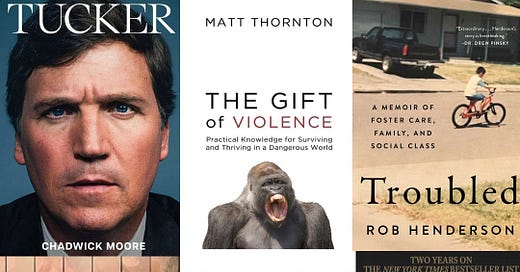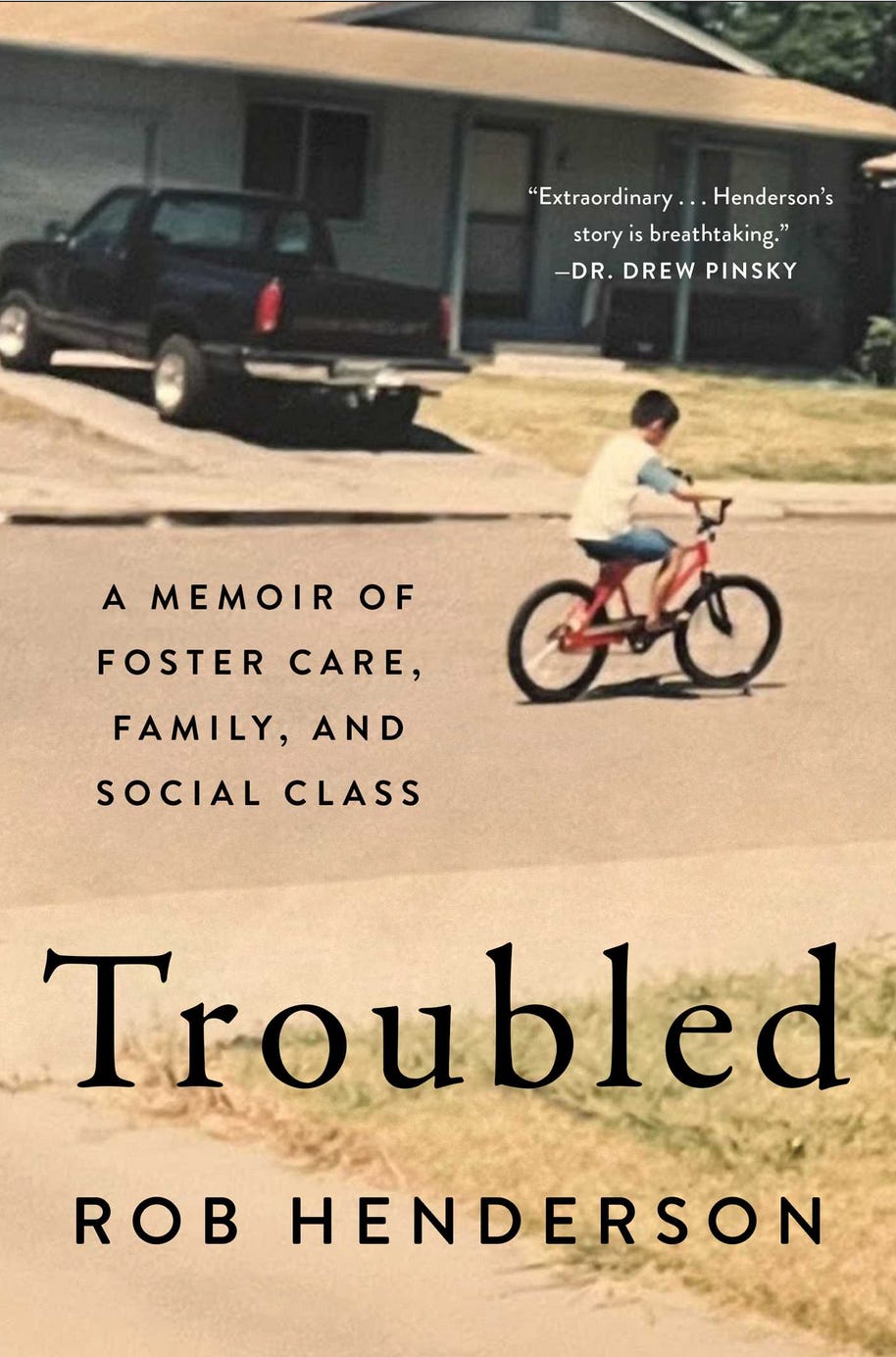From wild women to healthy violence, here are some of my favorite reads in 2023
I read a lot of good books in 2023 — here are some of my favorites
I tend to read more for work than for fun, but luckily reading for work is usually fun for me. I feel blessed to have the opportunity to read so many amazing books from so many insightful people, on account of my work, so want to share the love. Here are a few of my favorites (most of which I read to prepare for interviews, some of which I just read for interest):
by Chadwick Moore
Who would have predicted that in 2023 I would become a die hard Tucker Carlson fan? Not me! But the man the left loves to hate turns out to have more wit and integrity in his tie than all of CNN, CBC, and the New York Times combined.
My fall for Tucker really began when he was ousted from Fox, but after reading his biography, written by the charming Chadwick Moore, my admiration for Tucker was confirmed.
The book is a lovely read — Moore is a witty and engaging writer, who reveals a fascinating and original character, with a moral compass we should all aspire to.
I hate the caveat, “I don’t agree with everything he says,” because of course we don’t agree with everything anyone says, simply because we like them or respect their viewpoints, so I won’t say it.
If you aren’t already endeared to Tucker, and especially if you think you hate him, you should read this book. I promise you won’t regret it.
By Rob Henderson
It’s difficult to understand exactly how efficiently the foster care system can be at screwing kids up for life, but Rob Henderson paints an effective picture. While Rob has indeed succeeded in life, it was despite his upbringing, which consisted of an almost endless stream of abandonments and instability — the things that interrupt kids’ ability to thrive more than almost anything.
Rob points out that while “educated Americans talk about education as the be-all end-all” in terms of what defines success or failure in people’s lives, but in fact a stable and loving family home and upbringing is the thing that is most-likely to determine wellbeing. He demonstrates how easy it is for kids who otherwise have wonderful potential can fail, unsupervised, unsupported, full of anxiety or mistrust in the future.
Troubled is incredibly insightful, and beautifully written — offering insight into a life that those who claim the right to define who is suffering, why, and what to do about it really ought to read. Rob of course coined the term “luxury beliefs” in his newsletter,
, pointing to what the culture definers, media class, academics, social media influencers, and activists insist to be true, despite their lack of touch with reality.Troubled won’t be available for purchase until February, so be sure to pre-order now!
By Matt Thornton
In feminism especially, we learn that all male violence is bad violence. We want to “end male violence,” even. Primarily, of course, male violence against women, but as a practice, male violence in general is seen as a problem. Matt Thornton, jiu-jitsu black belt and owner of Straight Blast Gym in Portland, Oregon, offers another perspective: violence is not inherently a bad thing — indeed it is a part of life. Avoiding violent encounters is not always possible, unfortunately, so how can we develop a healthier relationship to violence? How can we use violence for good, instead of bad? How can we anticipate a potentially dangerous situation, and stay out of it, deescalate, or deal with it, if forced to? How can we make good people more dangerous to the bad ones? And where do those dangers tend to lurk, anyway? How do we learn to trust our instincts and recognize predators before it’s too late?
This book completely changed my perspective on violence, and I think it’s an invaluable contribution to discussions of crime, material reality, “gender,” threat, vulnerability, what “healthy masculinity” looks like, and what martial arts can offer men and women alike.
By Clarissa Pinkola Estés
This book was published in 1996, but I didn’t read it until this year (well, “listen,” to be accurate). And lord I wish someone had handed it to me at 17.
I listened to the audio version of Women Who Run With the Wolves while walking around Budapest this summer, as I was there for MCC Feszt, and it blew my mind. Clarissa Pinkola Estés reads it herself, which makes what I’m sure would be a good read even better, as she’s able to inject meaning into places it should be and tell stories in the most engaging ways they can be.
It turns out, as one might have predicted, that the wild woman archetype resonates with me — the free spirited, courageous, fiery woman committed to her autonomy above all else. It helped me understand why I feel so oppressed by relationships with men who seek to domesticate, control, squash my true self — the most valued aspects of me (perhaps why I feel so oppressed by relationships with men in general).
There are few things I regret in life as I generally find the lessons learned from mistakes to be invaluable, but I do regret not reading this book in my 20s. I — and probably most young women — could have used the message: trust your gut; it is a woman’s most powerful tool, and naturally the one most diminished.
Our power as women is questioned, mocked, and bred out of us in so many ways — this book is one way to remember not to give it up for anything.
By Benjamin Nolot
The world kids are growing up in today is unlike any other. The younger generations not only are growing up online, but in a culture that has fully normalized pornography. It is not just easy for kids to find, but it is unavoidable — pushed on them at every turn. Yet little has been done to curb this or to look at the impacts on individuals, relationships, and society at large.
Benjamin Nolot, founder of Exodus Cry, has researched the porn industry for many years now, revealing its dark and disturbing truths through documentary and, now, in book form. Raised on Porn offers a multifaceted look at the impacts of porn on our brains, our kids, our sex lives, and our sense of self, but goes beyond even that, providing tools for men who wish to stop using porn, and to parents who are raising kids in a porn saturated world.
In a culture that tells us “it’s just a fantasy,” Raised on Porn is a troubling but welcome relief.
By Aldous Huxley
Like Nineteen Eighty-Four, I originally read Brave New World for school — either in my later high school years or early college (I can no longer recall exactly). I revisted them both recently, and was horrified. The dystopian futures we had been warned about were upon us — sold as progressive utopias, rather than anti-human sci-fi nightmares.
Imagine a world without family, love, or traditional morals, where technology has freed us from inconveniences like pregnancies, attachments, and old age? Convenient, right? On the surface, it might seem so, but now more than ever we need to cling to the mess that is our human nature.
I can’t imagine many would read Brave New World and think it a dream worth striving towards, but the way we are handing over humanity to technology says different. Before we leap towards “Big Government/Tech knows best,” and hand over our perhaps inefficient but inarguably humanizing natures to convenience, we might do a quick revisiting of some of these all too relevant classics.











Regarding the last recommendation, it's rather annoying how so many books originally written as warnings seem to have been taken as guides or instruction manuals by people presently in positions of power.
Thanks Meghan for supplying my reading list for 2024!